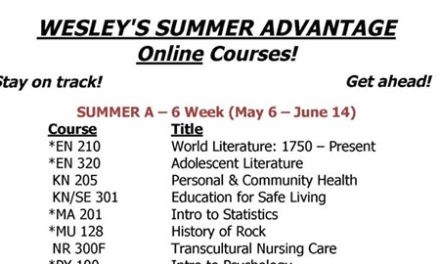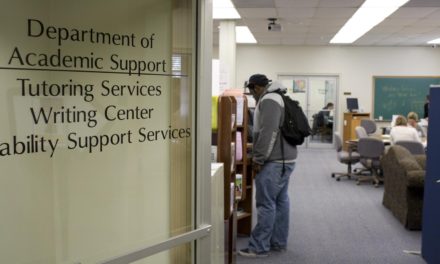By: Jeremy Harper (Whetstone Contributor)
           Wesley College is continuing to expand its academic catalog.
This past spring, faculty approved a Bachelor of Arts in Philosophy and Religion major.
“The program is intended to provide an opportunity for students to study the humanities,†said Dr. Alban Urbanas, co-chair of the philosophy and religion department.
The humanities also include topics such as language, history, philosophy and religion.
The major will offer a variety of courses meant to break students away from narrow-minded thinking, Urbanas said. Students will be exposed to a broad spectrum of beliefs.
Some of the courses offered include introduction to ethics, existentialism, western and eastern religions and the history of Christianity.
The major requires 36 credit hours.
In the spirit of broadening the mind, having a relatively small number of credit hours allows students an extent of academic freedom, Urbanas said, ultimately giving them the chance to seek a double major or a minor.
Philosophy and religion are weaved into society, instructor of religion, Dr. Brantley Craig said.
“Studying philosophy and religion helps to explain the music, art, and literature within our culture,†he said.
Despite their cultural impact, philosophy and religion aren’t known for their financially-sound careers. Yet, studies show that philosophy is ranked at No. 16 for mid-career median salaries – up to $81,200 a year.
           Steve Martin, successful Hollywood actor, and Alex Trebek, the television host of Jeopardy, both graduated college with a degree in philosophy.
Philosophy can also be integrated into business, such as billionaire George Soros, who integrates his philosophical beliefs into his business model.
           Studying philosophy and religion can help to develop important skills required for post-college life.
“We want to emphasize critical reading and writing,†said Dr. Jeffrey Mask, co-chair of the philosophy and religion department. “We also want to help develop a student’s ability to synthesize ideas and then express them.â€
Students will have opportunities to participate in philosophical and religious conferences, both in and out of state. There are also plans to travel to areas of philosophical and religious significance, both domestic and abroad.
“Without sounding too cliché, I’d hope students would be able to understand the world a little better,†Craig said.



